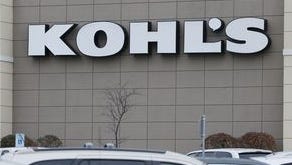Kohl's shares fall 19% as holiday sales slip

Shares of Kohl's Corp. sank 19% Thursday, as the Menomonee Falls retailer joined Macy's and others in feeling the pain of consumers' increasing preference for shopping online as opposed to department stores during the holiday shopping season.
With heavier-than-usual volume, Kohl’s shares lost $9.87 to close at $42.01 on Thursday. Trading for the day was seven times a typical day's volume on the stock, according to Google Finance.
Kohl’s had reported late Wednesday that sales fell 2.1% in November and December, well below analysts’ forecasts that sales would grow by 0.4%. That, coupled with store closures and disappointing results announced by Macy’s, hit retail stocks Thursday. Macy's shares fell more than 13%.
Robert W. Baird & Co. downgraded Kohl's stock Thursday and sharply reduced its price target to $44 a share from its previous target of $60.
“We were wrong to remain patient with shares despite worsening checks in recent weeks,” Baird senior analyst Mark Altschwager said in a research note.
The company had been well-positioned to compete this holiday season, with improvement in shopping tools such as mobile apps and an ability for consumers to buy products online and pick them up at their local store, he said.
But, Altschwager said, Kohl's results disappointed in part because fewer shoppers came to the stores and in part because much of its sales came during low-profit times of big promotions and discounts, such as Black Friday and the week leading up to Christmas.
"The consumer was the winner, with deals offered early and often through the holiday season," Altschwager said in an email.
RELATED: Kohl's accused of phony discounts
RELATED: Kohl's beats Target in Cyber Monday traffic
Altschwager warned that unless retail industry traffic trends stabilize, more cost-cutting at Kohl's will be required “and more store closures may be needed in 2017 and beyond."
At the same time, he said that for Kohl's, shutting stores wouldn't provide a short-term gain because its fleet of stores is "largely profitable."
Kohl's on Wednesday lowered its estimate of earnings for the full year. The company began 2016 projecting it would earn $4.05 to $4.25 a share for the year. In August, it reduced the estimate to $3.80 to $4. Now, Kohl's expects its 2016 earnings to come in at $3.60 to $3.65 a share.
The decline in Kohl's shares was part of an overall retail wreck on Thursday: Sears Holdings, in a move to raise cash, announced that it will sell its well-known Craftsman tools brand to Stanley Black & Decker for about $900 million, including future royalties.
That was in addition to Sears Holdings' plan, announced late Tuesday, to close another 150 stores, including 42 Sears stores and 108 of its Kmart locations. Kmart stores in Racine and Platteville are on the list of stores being closed.
Sears Holdings will still operate more than 1,300 stores following the latest closures, and they will continue to carry the Craftsman brand.
Selling the Craftsman brand to Stanley Black & Decker bolsters the balance sheet for Sears, which reported a $748 million loss in its fiscal quarter ended Oct. 29 as sales at stores open at least a year fell 7.4%.
Stanley Black & Decker said it would expand sales and manufacturing of the Craftsman brand, which currently gets 90% of its sales from Sears locations.
The move came several months after Sears put the Craftsman, Kenmore and DieHard brands up for sale as it seeks a so-far elusive turnaround. Investors cheered Sears' move, with shares up 4% Thursday.
Taken together, the steps reflect Sears' latest bid to stay afloat in a retail market that is weakening many big-box and department store chains.
Macy’s Inc., Kohl’s, J.C. Penney Co., Sears and others are all attempting to navigate a new retail landscape in which the magnetic north is now Amazon.com.
"The (brick-and-mortar retailers) are trying to prepare for a bigger shift to online and digital selling, but they haven’t caught up with how quickly consumers are shopping online versus the mall," said Kate Warne, investment strategist at Edward Jones.
Amazon this week said its Fulfillment by Amazon service delivered more than 2 billion items for a multitude of sellers globally last year. During the holiday season, the amount of Fulfillment by Amazon items shipped worldwide climbed more than 50%.
Separately, a report out Thursday from Adobe Digital Insights showed total online retail sales for November and December were up 11%, to $91.7 billion. Online retail sales topped $1 billion a day on nearly every day during the two months, Adobe said.
Another report that gauges both online and store sales of general merchandise said sales for the first eight weeks of the shopping season were down 1% from 2015. But consumers shopped in droves in the eighth week of that stretch this year — the final week leading up to Christmas and Hanukkah — with sales up 16% from the same week last year, according to the report from The NPD Group.
"Department stores are facing a multi-front assault," Altschwager said. "Consumers are spending less on apparel, shopping more online, and embracing the convenience of Amazon. Achieving even flat sales is an uphill battle."
USA TODAY and the Associated Press contributed to this report.